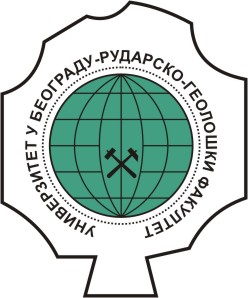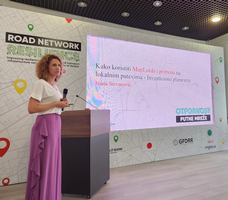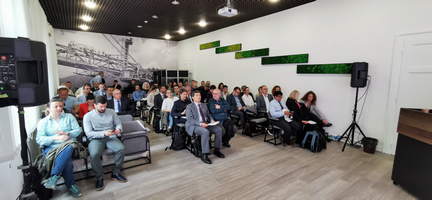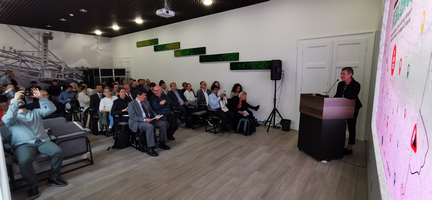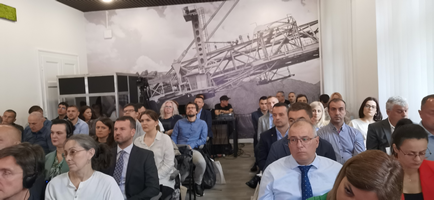Final Workshop
The results of the work have been presented at the workshop with the aim to present the findings and main results from the Improving Resilience and Safety of the Local Road Transport Network in the Republic of Serbia Project, financed by the World Bank and GFDRR grant. Furthermore, the World Bank seized this opportunity to introduce another project that bears close relevance to the subject of road network resilience. The project, titled "Local Transport Management Planning in Emergencies in the Republic of Serbia," was presented by Prepared International.While the work presented at the workshop is based on examples and pilots in the Republic of Serbia, it is also applicable to the other countries in the region.
Additional aim of the workshop was to bring together esteemed experts, professionals, and stakeholders from the transportation sector who share a common goal of promoting road safety and resilience in the Republic of Serbia.
Agenda
The Final Workshop for the projects took place on June 16, 2023, in the ceremonial hall (room 167) of the Faculty of Mining and Geology, located at Đušina Street 7, Belgrade. The workshop commenced at 10 AM and concluded around 3 PM.
| Time | Agenda | |
|---|---|---|
| 10:00 am | Start time | |
| 10:00 am – 10:15 am |
Opening remarks
|
|
| 10:15 am – 10:25 am |
Project presentation “Develop Methodology and a toll for assessing (local) transport network resilience and safety”
|
|
| 10:25 am – 10:35 am |
Arup in climate resilience sector
| |
| 10:35 am – 10:50 am |
Methodology for National Road Transport Network Vulnerability Assessment
|
|
| 10:50 am – 11:10 am |
Methodology for Local Road Transport Network Vulnerability Assessment
| |
| 11:10 am – 11:40 am |
Mobile Application (MaPLoRds) as a Local Road Transport Network Resilience Diagnostic Tool
|
|
| 11:40 am – 11:55 am | Coffee break | |
| 11:55 am – 12:15 pm | How to use MaPLoRds and Implementation on LSGs roads | |
| 12:15 pm – 12:40 pm | Discussion | |
| 12:40 pm – 01:20 pm |
Project presentation “Local Transport Management Planning in Emergencies in the Republic of Serbia”, Prepared International
| |
| 01:20 pm – 01:25 pm |
Closing remarks
|
|
| 01:25 pm – 02:30 pm | Lunch time |
Participants
Participants were from all relevant organizations in both the public and private sectors in Serbia, as well as representatives from the Western Balkan Region, including Bosnia and Herzegovina, North Macedonia, Montenegro, and Albania.
The attendance was good, resulting in approximately 50 invitees attending the workshop in person. For those who were unable to attend in person, a Zoom web link was provided to ensure their virtual participation. Approximately 35 participants joined the workshop online.
Among those present were representatives from various entities, including:
- Government agencies and ministries related to infrastructure and transportation
- Private sector companies involved in transportation and infrastructure development
- Academic institutions and research organizations
- Representatives from the World Bank and other international development organizations
- Delegates from the neighbouring countries
However, representatives from local self-government units were unable to attend due to the declared state of emergency in many municipalities caused by heavy rains and floods that occurred in Serbia during those days. Additionally, representatives from pilot LSGs (Kraljevo, Aleksandrovac, Pirot, Čačak) cancelled their attendance at the last moment due to the emergency situations in their respective municipalities.
All participants were provided with a tote bag containing presentation materials during the workshop. Additionally, the link to access reports and applications will be shared with the participants as soon as they become publicly available.
The presentation was in Serbian language, so simultaneous translation in English was provided for all participants who did not speak Serbian.

Discussion season
The diverse presence of workshop attendants contributed to a fruitful exchange of ideas and experiences during discussion season.
The feedback from the workshop was highly positive. There were suggestions to incorporate available hazard GIS databases from different government institutions into such projects, as well as discussions on the practical challenges hindering their implementation.
The conclusion drawn was that this project marks the beginning of supporting local communities in achieving road network resilience against climate hazards. While many things have been done, current floods with 51 municipalities declaring the state of emergency, tells us that major efforts are still ahead. As in terms of systematic monitoring and prioritization of interventions so in terms of targeted investments. Developed methodology and accompanying mobile application offers an easy and cost-effective platform to start serious work on this topic.
The project is expected to serve as a catalyst for generating other similar initiatives. It is crucial to continue working on improving approaches and methodologies. This workshop marked a significant milestone in addressing a growing necessity, highlighting the importance of resilience in the face of climate hazards. It is evident that further efforts and projects in this direction are increasingly essential.


